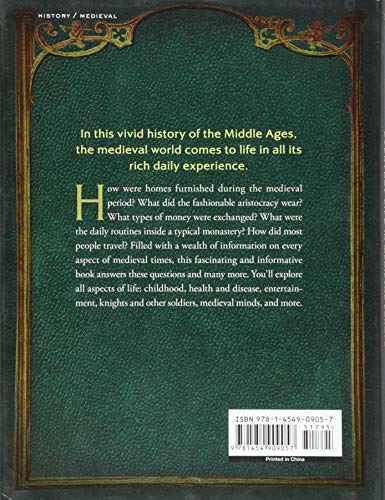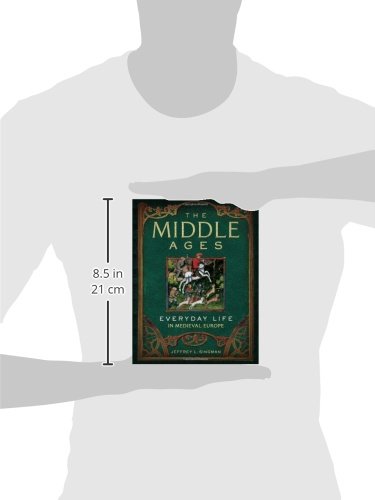



The Middle Ages: Everyday Life in Medieval Europe
A**A
Helpful for fantasy writers looking to pinpoint their setting.
This book is incredibly thorough, which can be great or tedious depending on your expectations.What I mean by that is, if you're looking for a granular explanation of medieval life than this book is for you - if you want to specifically read about village life as opposed to urban life, or clergy life, than you may want to skip sections or buy a book that is specific to medieval villages, etc.. I recommend the former, because this book is very thorough and does give you a step by step view of each topic.I found myself underlining lots of points and also found this very helpful as a fantasy writer. With regards to the latter, it was very eye opening in that I didn't realize just how structured daily life was especially with regards to class systems and the involvement of religious institutions. If you're a fantasy writer looking to write something in the same, or similar, theme to the Dragon Age series, etc. than this book will definitely help you along.If you're more interested in writing a story like Tolkien's trilogy, or George R.R. Martin's works, then you will want to look at a later time period - that is to say, the late middle ages.Game of Thrones fans can refer to this book somewhat more though, as there's a lot of overlap here since George R.R. Martin did base a good chunk of his stories on the War of the Roses, which itself took place between 1455–1485. This book, though, focuses a lot in the 1200-1350 range (high or "middle" middle ages). Essentially the development of complicated feudal and clerical systems, rather than the height of them.i.e.- If you're looking to base your tale on the rise of a post-antiquarian medieval society, like the early to early-high middle ages, this book is great for you.e.g. Dragon Age series, or the Saxon Chronicles. Basically when old religions were supplanted by new ones (old vs. new vibe) and the middle class (called the "bourgeoisie") did not quite exist just yet but maybe there was a slight hint of them. 90% of men were still not literate during this time period. Tolkien's works seems to skip this time period, as every one appears to already be literate and the Shire itself is very bourgeois. George R.R. Martin's works somewhat fall in this category as well, chiefly with literacy and religion but not so much so with regards to cities (his cities are too populated to fall into this category).- If you want your story to have more of a myth and legend theme (a la early romans, celts or vikings, etc. when gods were believed, in certain cultures, to live amongst people still and/or were more accessible - that is to say, less clergy involvement and more of a direct worshipper-to-deity experience), then use a different text covering an earlier time period (rather, the fringe/border between the two periods) for reference.e.g. Tolkien's works covering the early days of his world, like the "Silmarillion".- If you want an incredibly structured medieval-ish society that's still pre-gunpowder (i.e. "high fantasy"), with, say, densely populated cities, a widespread coinage system, wider spread literacy / education, the (very early) rise of something similar to a middle class, and easier travel (and swifter communication) then you will probably be better off not reading this book, because it mostly focuses on feudalism (which is very high middle ages, in contrast "high fantasy" is more late middle ages), and instead look for a book that specifically targets the approaching end of the middle ages itself. Although this book would still be helpful for building the "history" of such a world, mind you. So maybe ignore me and read on anyway.e.g. The Witcher series, Tolkien's trilogy, and maybe even George R.R. Martin's works although Martin is a bit jumbled because he does try to present an urban medieval society while still maintaining an old vs. new vibe with regards to religion so that's simply unique to his style thus maybe GRRM is also a bit of a fringe concept being more in the "high middle ages" which is basically another way of saying the middle of the middle ages.In simpler terms...Late Antiquity / Early Middle Ages: the history channel's Vikings series, or real life legends like King Arthur.Early Middle Ages (height of): The Silmarillion, or Saxon Chronicles series, or Andal invasion of Martin's series.[THIS BOOK] Early Middle Ages / High Middle Ages: Dragon Age series, real life legend of Robin Hood, or the real life Crusades.High Middle Ages / Late Middle Ages: The Hobbit, maybe. Or George R.R. Martin's world's recent histories, like Dunk & Egg, Robert's rebellion, etc.Late Middle Ages / Renaissance: Tolkien trilogy, the Witcher series, Game of Thrones, or real life War of the Roses.
S**X
A good introduction
I'm currently reading this book, and am enjoying it. It's a good introduction to everyday life in the Middle Ages, concentrating on the years 1100 to 1300. Keep in mind that the book is clearly an introduction to the subject, so it doesn't go into real deep detail in any one area. But for what it is, it's an interesting and educational book.
A**A
Un libro sencillo pero profundo (An easy reading but deep book)
El libro es una joya. Como muchas épocas históricas, la edad media, esta cargada de romanticismos e ilusiones. Y su más grande desafió es que existen 2 tipos de libros sobre ella: los para niños, que tratan de explicar sus particularidades sin mucho tecnicismos , o los especializados, que requieren de estudios y están cargados de términos pesados para el lector común. Este libro trata de llenar ese enorme hueco para el lector común, y lo logra de una manera excelente.En conclusión citando al autor "it was easy to find general works on medieval political institutions, and there were plenty of books on specific topics relating to ordinary life, but I lacked a good introduction to medieval society that offered a sense of how this world worked from the ground up." (era fácil encontrar trabajos generales sobre las instituciones políticas medievales y había muchos libros sobre tópicos específicos relacionados con la vida ordinaria, pero me hacia falta una buena introducción a la sociedad medieval que ofreciera un sentido de como estaba construido este mundo.).Hartamente recomendado, para una lectura a los aficionados de la Edad Media, siempre y cuando no sean Historiadores, seguro conocerán muchos mejores libros pero igual les funciona como apoyo a lecturas en sus clases, nunca se sabe.
S**H
Interesting and well-written
Extremely interesting book that not only covers the "physical" aspects of the everyday life in the European High Middle-Ages, but also their way of thinking and viewing the world - extremely relevant "mise en contexte", that we tend to forget while analyzing or reading about historical events and eras.Very well-written, easy to read, and accessible to all.The author gives an extensive list of biographical sources by category, giving the reader the opportunity to read more about a specific subject.A must read for anyone who's interested in the Middle-Ages!
M**Y
A good read!
Have used this book a lot when writing my first novel. Great information, and very organized. It’s in a language that doesn’t get boring, which I have seen in this type of book. Recommended for anyone wanting to further their knowledge on life in the Middle Ages
Trustpilot
1 day ago
3 weeks ago